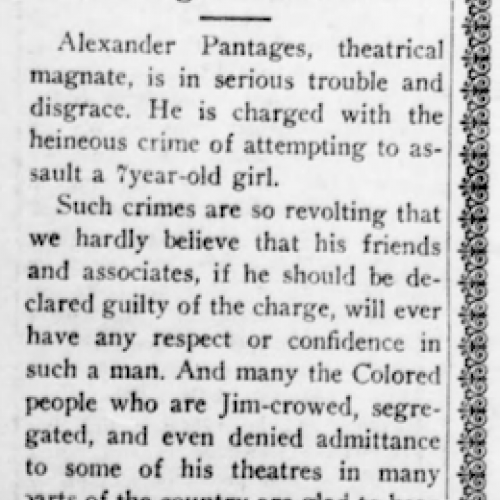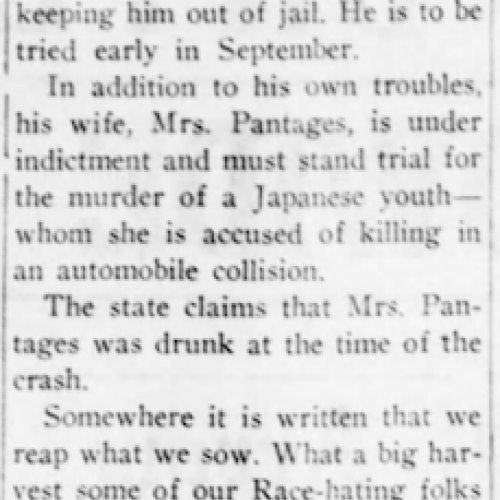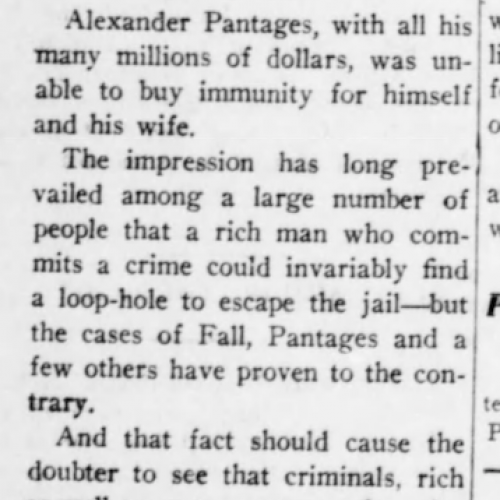Alexander Pantages was a Greek immigrant who opened more than 60 theaters across the western United States and Canada. The Pantages Theater circuit was quite successful, and three of its theaters still function today in Hollywood, Minneapolis, and Tacoma. During the 20th century, the theaters would showcase both films and live vaudeville performances.
There was a Pantages Theater in Portland that operated from 1927 to 1929, located at 759 SW Broadway, which was later torn down and converted into a Nordstrom in the ‘70s. Before it was remodeled for the Pantages in 1926, the building was originally constructed as the Orpheum Theater around 1913 (1). The lot was repurchased and converted into different theater chains several times before Alexander Pantages arrived. However, due to his criminal and racist behavior, the notorious Pantages Theater circuit came to a quick end in 1929.
It was not uncommon for theater operators in the early 20th century to discriminate against African-American moviegoers by refusing to grant entry or by segregating theater seating, and the Pantages was no exception. The Portland location, specifically, is known to have had segregated seating as it is mentioned in an article written by an attorney named Milo C. King in a local African-American newspaper called The Advocate. King tells of a client who was refused admittance to the theater due to his skin color. After some righteous haggling, the man was then provided with complimentary tickets for “some of the best seats in the house.” Unfortunately, it seems as if the manager of the Pantages only performed this courtesy because King outright suggested it: “…but I said think of the injustice and humiliation they (indicating the African-American moviegoer) have suffered which would entitle an ordinary white man to a judgement for something like $35,000; you should at least present them with complimentary tickets.” Milo C. King made certain to name the establishment as the Pantages, for it was known that this particular theater and its operator were quite discriminatory, despite Alexander Pantages’ similar struggles with being a thick-accented immigrant.
Another article written only days later in August of 1929, also published in The Advocate, details “Mr. Pantages’” criminal charge of “attempting to assault a [17] year-old girl.” The African-American paper makes light of his situation, suggesting that those “denied admittance to some of his theatres…are glad to hear of their arch enemy’s trouble.” In November, The Advocate provided closure to Pantages’ case, as well as an insight into the indifferent reactions of the theater’s bleak business future.
The Hollywood Pantages Theatre today operates under the promotional title of “Broadway in Hollywood,” exhibiting live performances of popular Broadway musicals such as Hamilton and Disney’s Frozen. It seems that the dark history of the Pantages’ operator has either been lost or ignored over the last century, as the Hollywood Pantages’ website gives all the credit to RKO’s Howard Hughes with no mention of Mr. Pantages’ movie chain legacy. This theater makes attempts to further separate itself from the Pantages name by highlighting its importance to the city by describing it as “one of the greatest landmarks of Hollywood.” (2)
(1) “Orpheum Theater 1976.” Vintage Portland, 25 Aug. 2011, vintageportland.wordpress.com/tag/pantages-theater/.
(2) “Hollywood Pantages Theatre.” Broadway in Hollywood, www.broadwayinhollywood.com/about/funfactsandhistory.


